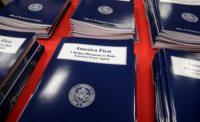Some Key Bills Enacted, Others Fall Short
As Congress recessed for a pre-election campaign push, lawmakers could point to several major construction bills that passed in the session’s final weeks and were signed into law. As usual, the House and Senate left much unfinished. Even a couple of the measures enacted—aviation programs and 2009 spending—only extend until spring. That means legislators will have to return to those issues next year.
Lawmakers had hoped to leave on Sept. 26, but the desire to finish a financial rescue bill kept them in session until that measure passed on Oct. 3. The rescue bill capped the Capitol Hill action, but there were other major construction-related legislative accomplishments.
A big win for state and industry transportation officials was approval of an $8-billion injection for the Highway Trust Fund’s weakening highway account.
| 2008 Congressional Scorecard | ||
|
Completed
Not Completed
Source: ENR, congressional committees | ||
In addition, Cathy Connor, Parsons Brinckerhoff senior vice president for government affairs, points to passage of the first Amtrak reauthorization bill “in many, many, many years.” The bill, which at press time awaited President Bush’s signature, includes $5.3 billion over five years for Amtrak capital programs. Some of that may go for rail cars, but the railroad also has substantial needs in areas like track, signaling and tunnels. “In some cases entire bridges need to be replaced,” says Amtrak spokesman Cliff Black. For example, the railroad wants to replace its crossing over the Niantic River in Connecticut. Still, the bill only authorizes the funds. It is up to congressional appropriators to determine how much actual money Amtrak will receive each year.
With a multiyear Federal Aviation Administration bill stuck in the Senate, lawmakers passed a series of short extensions. Shortly before the latest stopgap was to lapse, another was enacted. It carries airport construction grants and other FAA programs until April 1.
Similarly, most nondefense agencies will be funded through a continuing resolution until March 6, slightly more than five months into fiscal 2009. The measure holds most nondefense accounts at their 2008 levels.
Advocates of water programs made progress toward a long-desired reauthorization of Clean Water state revolving funds, but fell short of enactment. A $14-billion, four-year measure cleared the House in 2007, and the Senate Environment and Public Works Committee on Sept. 17 approved a five-year bill for clean water and drinking water SRFs, says Susan Bruninga, National Association of Clean Water Agencies’ director of legislative and public affairs. But there was no Senate floor vote before the recess.
Coming Back
There were other disappointments, including failure to pass a new economic stimulus measure with billions in infrastructure spending. The House approved a stimulus bill in September that had $30 billion for public works, but the Senate version was blocked when supporters failed to win a procedural vote on the floor. Still, Jeffrey D. Shoaf, Associated General Contractors’ senior executive director for government and public affairs, takes heart that legislators were talking about including public works in a new stimulus bill, “when it had been off the table at the beginning of the year.”
A lame-duck session is a possibility. Senate Majority Leader Harry Reid (D-Nev.) says the chamber will be in session starting Nov. 17 for several days. “But to see what business will be conducted, we will wait and see what, if anything, the House does,” he says. “If they do not do anything, we cannot do anything.”
Industry officials are looking ahead to 2009. With FAA and other nondefense spending bills expiring in the spring, Congress will have to pass at least further extensions to keep programs running. AGC’s Shoaf says, “Despite the fact that we’re closing out the [110th] Congress, we’re not closing out the work of the Congress.”



